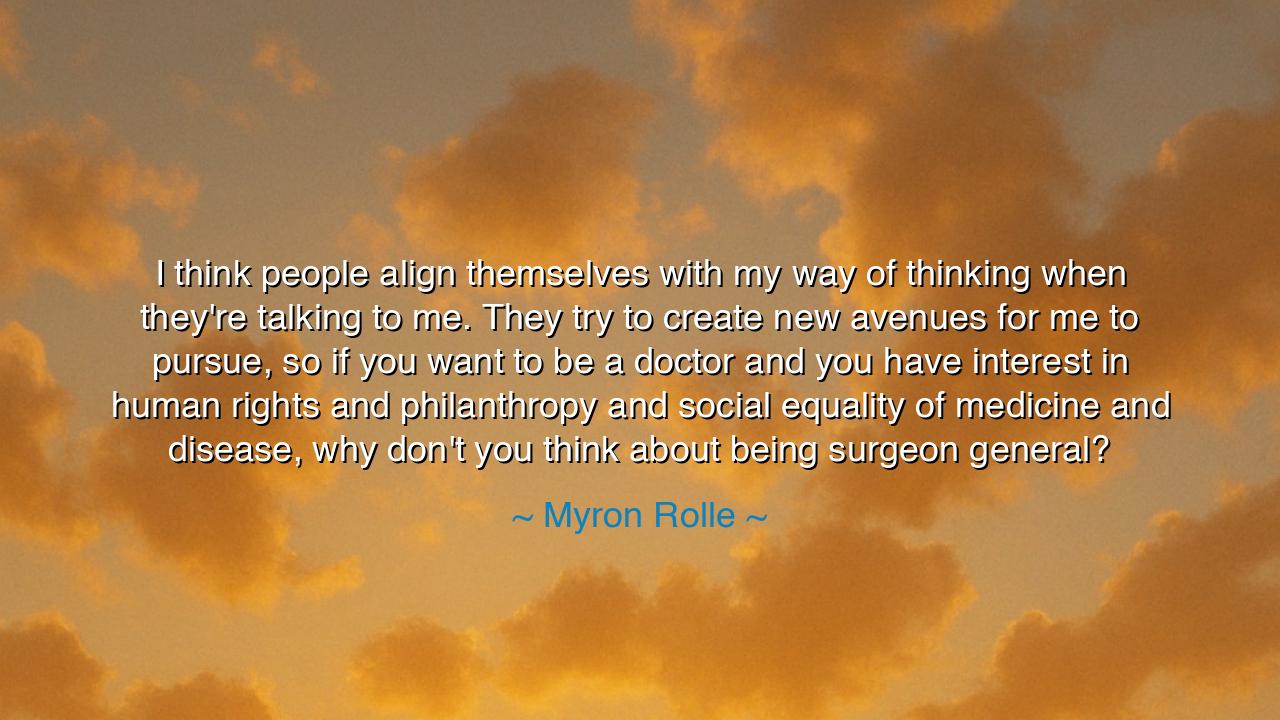
I think people align themselves with my way of thinking when
I think people align themselves with my way of thinking when they're talking to me. They try to create new avenues for me to pursue, so if you want to be a doctor and you have interest in human rights and philanthropy and social equality of medicine and disease, why don't you think about being surgeon general?






In the vast expanse of human existence, where every individual searches for purpose and meaning, there lies a profound truth that Myron Rolle speaks to: “I think people align themselves with my way of thinking when they're talking to me. They try to create new avenues for me to pursue, so if you want to be a doctor and you have interest in human rights and philanthropy and social equality of medicine and disease, why don't you think about being surgeon general?” These words speak to the power of vision, the ability to see beyond the limitations of traditional paths, and to align oneself with higher ideals that lead to a life of greater purpose. It is an invitation to not just live a life defined by career, but one defined by impact, justice, and the courage to walk paths that have yet to be explored.
The ancients understood that purpose was not a mere destination, but a journey that required one to navigate the ever-changing currents of life. In Greek mythology, the story of Theseus is a perfect illustration of this journey. Theseus was the great hero who ventured into the labyrinth to confront the Minotaur. Though many of his contemporaries saw his path as one of bravery and destiny, Theseus chose a path that few could have foreseen: he did not simply seek glory, but also worked to rid the world of evil and offer freedom to those oppressed. Similarly, Rolle's reflection calls us to not only pursue our own goals but to think larger, to challenge ourselves to integrate our passions into the service of others. Rolle encourages us to expand our vision, to consider human rights and social equality as essential threads in the fabric of our careers, thereby making our pursuits meaningful in ways that resonate beyond personal success.
Rolle’s challenge to envision a future where medicine, philanthropy, and human rights intersect also mirrors the ancient Roman ideals of civic duty. The Romans believed that true greatness was found not in personal wealth or power, but in the service of the community. Cicero, the great orator and statesman, argued that the purpose of a man’s life was to serve the greater good, and that one's legacy would be determined not by what was accumulated but by the impact one left on society. In much the same way, Rolle’s words are not simply about choosing a career but about aligning one's life with the greater good. He calls us to seek not only personal success but to contribute to something larger, where the roles we take on—whether as a doctor, a philanthropist, or an advocate—become vehicles for the pursuit of justice and equality.
The story of Hippocrates, the ancient Greek physician, offers a tangible example of this intersection of medicine and human rights. Hippocrates, often called the father of medicine, laid the groundwork for the ethical practice of medicine, emphasizing the healing of the whole person and maintaining the dignity of those seeking care. His famous Hippocratic Oath calls on physicians to do no harm, not just in the practice of medicine, but in their ethical responsibilities toward all individuals. Rolle's vision aligns with this ancient understanding: that medicine is not just about curing illness but about serving the broader human condition—addressing issues like social inequality, access to healthcare, and justice in medical practices.
What Rolle urges us to see is the power of combining our passions and our ideals into a cohesive vision. If one seeks to be a doctor, it is not enough to simply tend to the body. We must also look at the system—at the conditions that perpetuate inequality in healthcare and in society at large. This is where Rolle’s call for new avenues becomes critical: medicine, in its truest form, is not about isolated acts of care but about understanding the societal structures that shape health outcomes. This approach sees the doctor not just as a healer, but as an advocate for human rights and equality, someone who works to ensure that the right to healthcare is a universal right, available to all, regardless of race, gender, or social class.
The lesson we take from Rolle's words is that we must constantly ask ourselves: What is the larger purpose behind our ambitions? How can our work serve not just our own desires but the common good? Rolle calls on us to align our professional lives with broader social causes, to think beyond the narrow confines of career and instead, ask ourselves how we can make a meaningful contribution to the world. It is not enough to simply succeed in our chosen fields—we must ask how our success can be a tool for change and justice.
Let us then take up the mantle of service, as Rolle and the ancients suggest. Let us not choose careers solely for personal gain, but for the impact we can have on the lives of others. Let us align our actions with our highest ideals, recognizing that true success comes not from accolades or wealth, but from the ability to shape a world where human dignity and equality are not just ideals, but lived realities. In the path we choose, may we always remember that the journey is not just about reaching a destination, but about serving others along the way, and contributing to a greater good that echoes through the ages.






AAdministratorAdministrator
Welcome, honored guests. Please leave a comment, we will respond soon